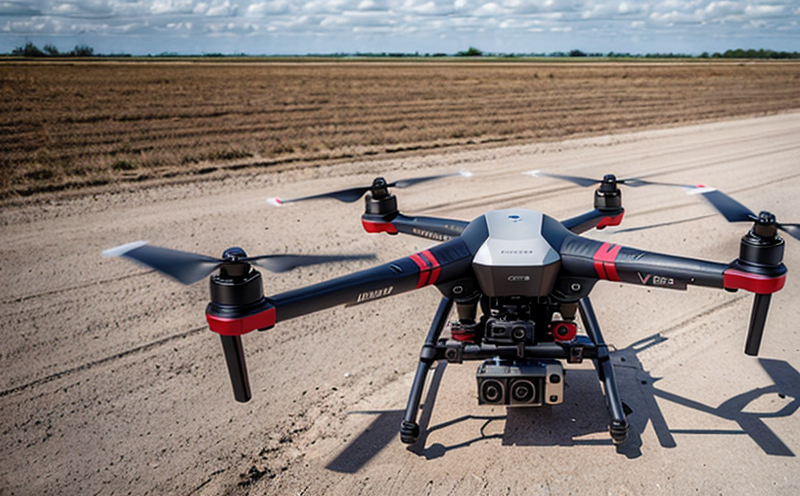ASTM F3388 UAV Battery Safety and Reliability Testing
The ASTM F3388 standard is a critical document that sets forth the testing requirements for ensuring safety, reliability, and performance of batteries used in unmanned aerial vehicle (UAV) systems. This service is designed to meet the stringent demands of aerospace and aviation sectors where safety and compliance are paramount.
Our laboratory uses ASTM F3388 as a foundation for our UAV battery safety testing program. The standard covers various aspects including thermal, mechanical, electrical, and abuse testing aimed at identifying potential hazards early in the development process. This comprehensive approach ensures that batteries are not only safe to operate but also reliable under diverse conditions.
The testing procedure involves several steps which include initial inspection of the battery, setup for different types of tests such as overcharge, over-discharge, short-circuiting, and thermal abuse among others. Each test is conducted with precision to replicate real-world scenarios that a UAV might encounter during flight operations. After completion of all tests, detailed reports are generated highlighting any anomalies observed along with recommendations for improvement.
Our experienced team ensures adherence to industry best practices while conducting these tests. We pride ourselves on providing accurate, reliable results that can be used by manufacturers and operators alike to ensure their products meet regulatory requirements. By leveraging ASTM F3388 guidelines, we help our clients build safer, more efficient UAVs which contribute positively towards sustainable aviation.
Our commitment to quality does not stop at compliance with industry standards; it extends beyond into ensuring continuous improvement in product design and manufacturing processes. Our laboratory is equipped with state-of-the-art facilities designed specifically for UAV battery testing according to ASTM F3388 specifications. This enables us to provide consistent, repeatable results across multiple batches of batteries.
By choosing our ASTM F3388 UAV Battery Safety and Reliability Testing service, you gain access not just to technical expertise but also peace-of-mind knowing that your product meets the highest standards in terms of safety and reliability. Let us work together towards building safer skies by partnering with us today!
Applied Standards
| Standard | Description |
|---|---|
| ASTM F3388-19 | This standard covers the testing procedures for lithium-ion batteries used in UAV systems. It includes tests such as overcharge, over-discharge, short-circuiting, and thermal abuse. |
| IEC 62137:2015 | International Electrotechnical Commission standard relating to the safety of rechargeable batteries used in portable electronic devices. While not directly applicable to UAVs, it provides additional insights into battery safety practices. |
| AAR-82C | Aerospace and Aeronautics Research Association’s specification for lithium-ion cells intended for use in aviation applications. This standard complements ASTM F3388 by offering more detailed guidance on specific aspects like cell design and manufacturing. |
Scope and Methodology
The scope of our ASTM F3388 UAV Battery Safety Testing includes evaluating the performance, durability, and safety of lithium-ion batteries used in unmanned aerial vehicles. This service encompasses a range of tests designed to assess various parameters including electrical characteristics, thermal stability, mechanical integrity, and resistance to abuse conditions.
- Overcharge Test: Simulates what happens when a battery is exposed to prolonged charging beyond its normal limits.
- Over-discharge Test: Evaluates the behavior of a battery when discharged below its nominal voltage.
- Short Circuiting Test: Tests the ability of a battery to handle short circuits without causing internal damage or hazardous reactions.
- Thermal Abuse Test: Exposes a battery to extreme temperatures to determine if it can withstand such conditions safely.
Each test is conducted meticulously following ASTM F3388 guidelines ensuring consistency and accuracy. Our team monitors all tests closely, recording data points throughout the process to ensure compliance with specified criteria. Once completed successfully, we issue detailed reports summarizing findings and any areas requiring further attention or improvement.
Quality and Reliability Assurance
- We follow rigorous quality control measures during specimen preparation ensuring consistency in sample characteristics.
- All tests are conducted in controlled environments to minimize external variables affecting results.
- Data analysis is performed using advanced software tools providing precise measurements and interpretations.
- Our reports come with clear recommendations based on findings from each test facilitating informed decision-making by clients.
We maintain strict adherence to all relevant standards including ASTM F3388, IEC 62137:2015, AAR-82C among others. Our comprehensive approach ensures that every aspect of battery performance is thoroughly examined before certification or approval can be granted.





